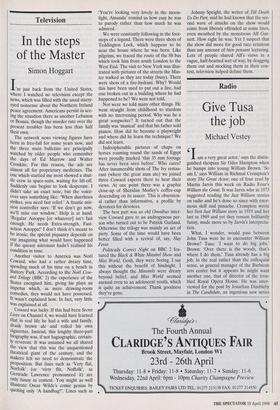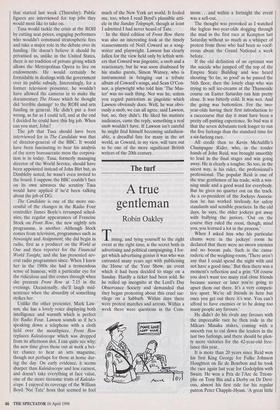Radio
Give Tusa the job
Michael Vestey
Iam a very great actor,' says the distin- guished thespian Sir Giles Hampton when he bumps into young William Brown. `So am I,' says William in Richmal Crompton's story The Great Actor, one of four read by Martin Jarvis this week on Radio Four's William the Great. ft was Jarvis who in 1973 suggested reading the Just William stories on radio and he's done so since with enor- mous skill and panache. Crompton wrote her first Just William story in 1919 and her last in 1969 and yet they remain brilliantly funny, made more so by Jarvis's interpreta- tion.
What, I wonder, would pass between John Tusa were he to encounter William Brown? Tusa: 'I want to do big jobs.' Brown: 'Over there is the woods, that's where I do them.' Tusa already has a big job, in the real rather than the colloquial sense, as general manager of the Barbican arts centre but it appears he might want another one, that of director of the trou- bled Royal Opera House. He was inter- viewed for the post by Jonathan Dimbleby in The Candidate, an ingenious new series that started last week (Thursday). Public figures are interviewed for top jobs they would most like to take on.
Tusa would tackle the crisis at the ROH by cutting seat prices, engaging performers who wouldn't command stratospheric fees and take a major role in the debate over its funding. He doesn't believe it should be privatised as, unlike in the United States, there is no tradition of private giving which allows the Metropolitan Opera to live on endowments. He would certainly be formidable in dealings with the government over its public subsidy. Interestingly, for a former television presenter, he wouldn't have allowed the cameras in to make the documentary The House which he thought did 'terrible damage' to the ROH and arts funding in general. He didn't put a foot wrong, as far as I could tell, and at the end I decided he could have this big job. When can you start, John?
The job that Tusa should have been interviewed for in The Candidate was that of director-general of the BBC. It would have been fascinating to hear his analysis of the sorry bureaucratic mess the corpora- tion is in today. Tusa, formerly managing director of the World Service, should have been appointed instead of John Birt but, as Dimbleby noted, he wasn't even invited to the board. I suppose the BBC couldn't face on its own airwaves the scrutiny Tusa would have applied if he'd been talking about the job of DG.
The Candidate is one of the more suc- cessful of the changes in the Radio Four controller James Boyle's revamped sched- ules; the regular appearances of Francine Stock on Front Row, the new nightly arts programme, is another. Although Stock comes from television, programmes such as Newsnight and Assignment, she did begin in radio, first as a producer on the World at One and then reporter for the Financial World Tonight, and she has presented sev- eral radio programmes since. When I knew her in the 1980s she had a tremendous sense of humour, with a particular eye for the ridiculous and this comes through when she presents Front Row at 7.15 in the evenings. Occasionally, she'll laugh mid- sentence when the absurdity of something strikes her.
Unlike the other presenter, Mark Law- son, she has a lovely voice displaying both intelligence and warmth which is perfect for Radio Four. Lawson sounds as if he's speaking down a telephone with a cloth held over the mouthpiece. Front Row replaces Kaleidoscope which was dropped from its afternoon slot. I can quite see why; the new time gives those out at work a bet- ter chance to hear an arts magazine, though not perhaps for those at home dur- ing the day. On early evidence, it seems sharper than Kaleidoscope and less earnest, and doesn't take everything at face value, one of the more tiresome traits of Kaleido- scope, I enjoyed its coverage of the William Boyd 'Nat Tate' hoax that seemed to fool much of the New York art world. It fooled me, too, when I read Boyd's plausible arti- cle in the Sunday Telegraph, though at least I admitted I had never heard of Tate.
In the third edition of Front Row there was also an interesting look at the timely reassessments of Noel Coward as a song- writer and playwright. Lawson has clearly fallen for the view held only by leftish writ- ers that Coward was jingoistic, a snob and a reactionary, but he was soon disabused by his studio guests, Simon Watney, who is instrumental in bringing out a tribute album of Coward's songs, and Sean O'Con- nor, a playwright who told him 'The Mas- ter' was no such thing. Nor was he, unless you regard patriotism as jingoistic which Lawson obviously does. Well, he was obvi- ously a snob, we can all agree, said Lawson, but, no, they didn't. He liked his matinee audiences, came the reply, something a real snob wouldn't have. If Lawson isn't careful he might find himself becoming unfashion- able, a dreadful fate for many in the art world, as Coward, in my view, will turn out to be one of the more significant British writers of the 20th century.



























































 Previous page
Previous page